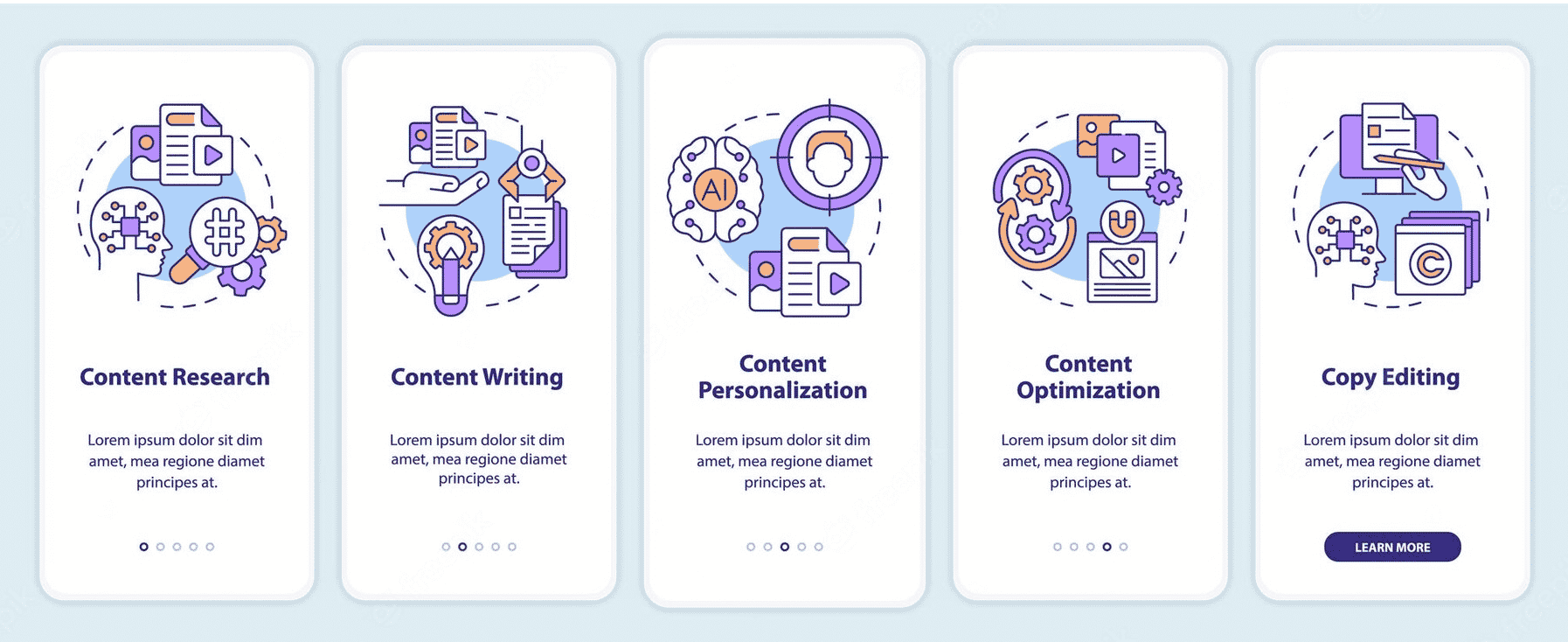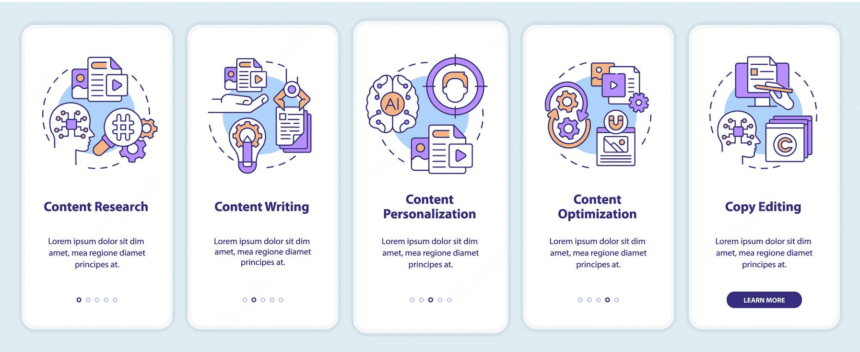
Introduction
While artificial intelligence based content writing is smart enough to come up with a few short, easy words and assist writers in getting over writer’s block, it’s still a long way away from being able to produce content that is as good as a decent copywriter, much less a great one, yet!!
In order to create human-interpretable content, artificial intelligence tools utilize texts, statistics, or images as inputs. Typically, an algorithm scans this data and then sorts the contents based on pre-programmed structures, tokenization, etymology, lemmatization or statistical input.
Creating digital content with AI isn’t exactly a new idea. Organizations have always leaned on technology to create reports, product descriptions, and data insights. Content creation now incorporates AI writing tools in multiple ways. This helps human writers come out with AI generated content to feed their audience.
Using AI, marketers can generate social media content, email content, personalized messages, and more. They can also analyze competitors and assess content optimization using AI. It is possible to create a content brief instantly or to discover a keyword by understanding what the user wants. In addition to using keywords and other SEO tactics, AI can assist content creators to rank their websites higher within Google’s search results page based on keywords.
In addition to assisting in creating content, AI can also assist with drafting sentences and paragraphs that can be reviewed by editors and posted online, based on analyzing the topic and coming up with related information and keywords. This helps human writers create content marketing strategies that may have been skipped. As content generators, we want our content to reach at scale and we are able to produce content at scale. While the AI writing tools are great content marketers should always add an additional layer of human intervention to relevant content when necessary.
Table of contents
Also Read: The Role of AI in Content Moderation
What are the benefits of AI for content writers?
Overcome writer’s block
Traditional authors are always deal with writers block, something that AI can help. It is possible to use AI to come up with content creation process, that help alleviate the writers block by generating multiple variations of content strategies. Contextual human oversight is still important for this process.
AI Based Content Optimization
There are several search engine optimization tools that writers can use in order to provide data-driven suggestions, to improve SERP ranking, by using machine learning, natural language processing (NLP) and Natural Language Generation (NLG) to plug gaps within content.
Artificial intelligence based tools can analyze millions of pieces of content and construct topic models in seconds by combining deep learning and natural language processing (NLP). This can help content creators plug gaps in content that would be helpful for readers.
Content Moderation
With massive amounts of content being created it is impossible for humans to moderate the content. With AI and its ability to identify patterns in large data sets, it is easier for an ML algorithm to moderate content based on the parameters set. These tools can flag a piece of content but a human overseeing the process can investigate the content before allowing or blocking it.
Scaling Content Production
An AI content generator might also be useful for large-scale content creation. For entrepreneurs and bootstrapped businesses who lack a dedicated content team, an AI generator might be a helpful tool.
Language Translation
AI can help content creators in translating content in multiple languages that can help their readers in various parts of the world. This helps your content reach a much wider audience than being limited to the language your content is written in.
Automatic Editing and Proofreading
The AI capabilities of software such as Grammarly, for instance, helps you with grammar, typos, vague language, passive voice, and formatting issues. Non-native content creators, who may need additional help with the content they are working on or if they are writing an email.
Checking for Plagiarism
In universities and at publishers, plagiarism is a common problem as they continue to push out original content. It is easy to spot egregious plagiarism by searching Google for just a couple of lines from a document, but if a writer or student has changed, context by adding / editing it is much harder.
An AI bot called Emma Identity can be used to identify the authorship of a piece of content. These content tools with better data sets can improve plagiarism checks.
Searching Through Audio/Video Files
In terms of search-ability, text has always had a huge advantage over audio and video formats as it is searchable. Hence, if you are looking for information or investigating a certain topic, text will certainly be the best choice. This leaves a pretty big gap in terms of research.
In recent years, artificial intelligence has enabled audio search to become a reality. With text to speech and vice versa tools available in the market like Siri, Google home and Alexa which are constantly learning new things through constant interaction and holding large data sets audio search becomes critically important. The speech to text conversion becomes easier as it gets democratized by AI.
Also Read: These Pieces of Music Were Created Using Artificial Intelligence (AI)
Medical Transcriptions
One more critical field where AI can help is medical transcription, it saves medical practitioners a lot of time and helps medical facilities become a lot more efficient. It can help digitize files and save them on cloud to make the entire process seamless and efficient while being available anywhere.
Predictive Intelligence
By collecting data about your existing and potential customers’ behaviors, predictive intelligence allows you to create distinct profiles based on their characteristics. Machine learning algorithms can help human content writers understand context of why content should be produced based on critical data insights. Predictive intelligence helps remove the guesswork from the content you want to produce and folks who want to consume it.
Music
Whilst music has changed dramatically over the past 70 years, there are a few things in the relationship between music and AI that have remained constant. One of those is the high level of variety in the composition techniques used. Another is the style of music that was generated by AI.
Best AI content generation tools
Here’s a list of some of the best AI tools you can use to generate content.
Jarvis.ai
Jarvis.ai, as the name implies, is based on artificial intelligence that can create a range of different types of content pieces. One can use it to create various pieces of content. It can create social media posts, to large blog posts, as long as you are able to provide some keywords and context. It is important to note that human intelligence combined with tools like these can help improve your content dramatically.
MarketMuse
MarketMuse is a tool that gives you a list of the most relevant terms, topics, and headlines for a topic you should include in your article or blog post in order for it to rank higher in search engine results by helping to cut down gap in your content.
HubSpot
HubSpot is a content strategy tool based on AI that offers content ideas for content creators based on clustering of topics. Topic clusters are also based on relevance and competition, so you can determine which topics are relevant and which ones are competitive.
AI content creation: How will it evolve?
A new report from the Search Engine Journal predicts that AI will be generating a lot more content for us in the next two decades, and AI will become more commonplace over the course of time. To prepare for the future, companies need to stay on top of the latest technology and help train their workers to adapt to it.
Artificial intelligence will not render human content creators redundant, but help make their jobs easier. Human content creators will focus on the larger picture ideas while AI can help with all the mundane tasks of writing.











